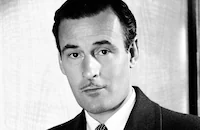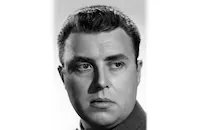Rio Rita

Brief Synopsis
Cast & Crew
S. Sylvan Simon
Bud Abbott
Lou Costello
Kathryn Grayson
John Carroll
Patricia Dane
Film Details
Technical Specs

Synopsis
Stranded New Yorkers "Wishy" Dunn and "Doc," who have been fired from their pet store jobs in Texas, hide in the trunk of a car with a New York license plate, hoping to get back home. Unfortunately, the car belongs to radio singing star Ricardo Montera, who is on his way home to Vista Del Rio for the first time in ten years. Rita Winslow, the young owner of the town's resort hotel, is Ricardo's childhood sweetheart, and hopes that stardom has not changed him. Unknown to Rita, the hotel's manager, Maurice Craindall, is a Nazi agent who is going to use Ricardo's planned national radio broadcast to send a coded sabotage message. At the hotel, while Doc and Wishy find their way out of the trunk, Ricardo rides out into the desert and hears one of his recordings being accompanied by Rita. She pretends that she is not impressed by him, but when they return to the hotel, she becomes jealous of Lucette Brunswick, one of Craindall's cohorts, who has been told to make a play for Ricardo. A few minutes later, two of Craindall's men, who also work for the hotel, find the starving Doc and Wishy stealing food. When the kind-hearted Rita realizes what is happening, she says that she gave them the food, then gives them jobs as house detectives. In return for her kindness, Doc and Wishy decide to help her and Ricardo get together. That night, Ricardo sings to Rita at the hotel's nightclub, but she refuses to listen because she thinks he has turned into a playboy. Later, Doc and Wishy find Lucette in Craindall's office, and, with money they have found, try to bribe her to stay away from Ricardo. After she leaves, they find some flammable liquid and a code book, which they decide to keep. Harry Gantley, who is also working at the hotel, sneaks in through a window a moment later and tells Doc and Wishy that he is a member of the Secret Service. He starts to tell them what to do if he is killed, but is shot dead before he can finish. Just after the frightened Doc and Wishy flee the office, Craindall and his cohorts enter, along with Ricardo and some other guests. Trask, Craindall's right-hand man, feigns surprise at finding the body and says that there must have been a robbery. Later Lucette confronts Ricardo in the garden and lies that she is Gantley's partner and is trying to capture some Nazi spies. When Rita, who has decided to give Ricardo another chance, happens by, Lucette pretends to make love to him. Ricardo then goes to Wishy and Doc and they tell him about the code book. Later, Ricardo tells Rita that he has always loved her and tries to tell her about Craindall, but she will not listen. That same night, Lucette goes to Wishy's room to find the book, but is unsuccessful. Later, Ricardo tells Wishy that he hid the book and will try to get it to Washington. Doc and Wishy then go through a series of escapes and captures by Craindall's men, while at the same time, Ricardo is prevented from leaving and he and Rita are forced at gunpoint to proceed with the broadcast. Just as Craindall's code is about to be broadcast, he hears animal hooves and men singing "The Ranger's Song" and thinks that the Texas Rangers have arrived to arrest them. This is all thanks to Wishy's use of some donkeys and his request that the local radio station play "The Ranger's Song." After the spies escape in waiting taxicabs, a huge explosion is heard, and Wishy says "Goodnight, folks."

Director

S. Sylvan Simon
Cast

Bud Abbott

Lou Costello

Kathryn Grayson

John Carroll

Patricia Dane

Tom Conway

Peter Whitney

Barry Nelson
Arthur Space
Dick Rich
Eva Puig
Joan Valerie
Mitchell Lewis
Eros Volusia
William Tannen
David Oliver
Julian Rivero
Douglass Newland
Lee Murray
Inez Cooper
Jenny Mac
Vangie Beilby
Ruth Cherrington
Frank Penny
Robert Bradford
J. D. Jewkes
Nacho Galindo
Alfredo Garmo
Mercedes Ruffino
Morton Scott
Tudor Williams
The Guadalajara Trio
Flores Brothers
Crew
Zequínha Abreu
Harold Arlen
Leo Arnaud
Jules Barbier
Pandro S. Berman
Lorraine Bridges
Michel Carré
Richard Connell
Murray Cutter
Clyde De Vinna
George Folsey
Cedric Gibbons
John Grant
E. Y. Harburg
Eddie Imazu
Kalloch
Gladys Lehman
Ben Lewis
Harold Lipstein
Paul Marquardt
Joseph Mccarthy
Giacomo Meyerbeer
Warren Newcombe
David Robel
Buford Robert
William Ryan
Douglas Shearer
Gile Steele
Herbert Stothart
Harry Tierney
Edwin B. Willis

Videos
Movie Clip



Trailer
Hosted Intro
Film Details
Technical Specs

Articles
Rio Rita (1942)
By Glenn Erickson

Rio Rita (1942)
Quotes
Trivia
Notes
Several Bud Abbott and Lou Costello sight and language gags and burlesque sketches are used throughout the film. One long sequence involves their attempts to get out of the car's trunk after discovering that it has been elevated on a garage lift. Another prominent gag involves their escape through a laundry chute and Costello's attempts to get out of the hotel laundry's huge automatic washing machine.
According to a October 19, 1938 Hollywood Reporter news item, M-G-M was about to purchase from RKO the rights to Rio Rita, a 1927 Broadway musical produced by Florenz Ziegfeld, written by Guy Bolton and Fred Thompson, with songs by Harry Tierney and Joseph McCarthy. At that time, M-G-M planned to make a musical version of the play as a vehicle for their popular singing team Jeanette MacDonald and Nelson Eddy. A January 1941 Hollywood Reporter news item noted that RKO wanted to sell the picture rights to M-G-M and that, according to RKO president George J. Schaefer, a year previously M-G-M had agreed to a sale price of $85,000 plus the loan of Robert Young, Robert Montgomery or James Stewart, but that the deal "may now turn sour." The agreement was apparently completed by early June 1941, but additional details of the terms between the two studios have not been found. Although two songs from the Broadway musical were retained for the M-G-M film, the title song and "The Ranger's Song," the film's story line bears no resemblance to the play and the film's screenplay was credited as an "original" by the SAB. Two additional songs were written for the film, according to Hollywood Reporter news items, "Unusual Weather" and "Whippoorwill," but they were not in the released picture and May not have been filmed.
Pre-production news items indicate that M-G-M originally wanted to borrow Arthur Lubin from Universal to produce the picture and that opera singers Marta Eggerth and Risë Stevens were both considered for the female lead. Although Bud Abbott and Lou Costello were under contract to Universal, terms of their contract enabled them to make one picture a year away from their home studio. Location shooting was completed near Palm Springs, CA. Hollywood Reporter news items indicate that Clyde DeVinna shot exteriors and locations for the film, while George Folsey shot the studio scenes. One news item indicated that Harold Lipstein shot some exteriors near Hemet, CA. Brazilian dancer Eros Volusia made her screen debut in the film. Actors who were mentioned in news items, but whose appearances in the released film cannot be confirmed include Diane Brook, Grace Ritchie, Janet Barrett, Dorothy Ward, Mina Harragut, Dorothy Gilmore, Marjorie Raymond, Eleanore Kallejian, Anita Maisnik and Mary Manners. Although a still photograph indicates that actress Alice Kirby was cast in the production, her appearance in the released film has not been confirmed. In addition to the Luther Reed-directed RKO production of Rio Rita, which was produced in 1929, starring Bebe Daniels and John Boles (see AFI Catalog of Feature Films, 1921-30; F2. 4625), an NBC television version of the musical play was produced in 1950.

















